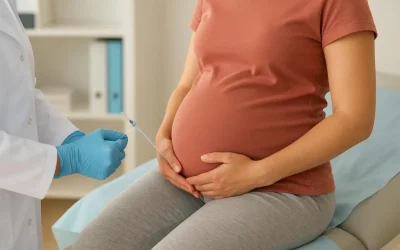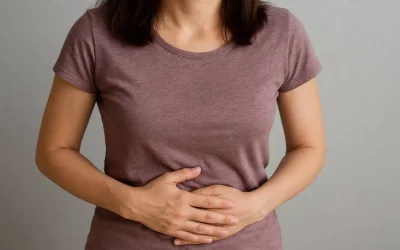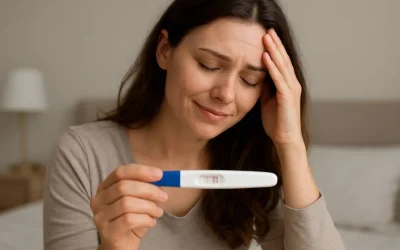Can Twins Cause a False Negative Pregnancy Test?

If you’re wondering whether carrying twins can cause a false negative pregnancy test, the short and clear answer is yes, it can happen — but it’s very rare.
A false negative means the test says you’re not pregnant when you actually are. While most pregnancy tests work just fine even if you’re pregnant with twins, there are some surprising reasons why the test might not catch it right away.
Let’s break it all down and answer every question that might be running through your mind — in the simplest and most friendly way possible.
What Is a False Negative Pregnancy Test?
A false negative pregnancy test happens when you’re pregnant, but the test says you’re not. That can be incredibly confusing, especially if you’re feeling pregnancy symptoms or have missed your period. So why does this happen?
It usually has to do with timing, hormone levels, or the test itself. Sometimes your body just hasn’t produced enough of the pregnancy hormone (hCG) yet. Or maybe the test wasn’t sensitive enough. Sometimes, there’s more going on — like carrying twins.
How Do Pregnancy Tests Work, Anyway?
Before diving into twins, let’s quickly understand how pregnancy tests work. When a fertilized egg attaches to your uterus, your body starts making a hormone called human chorionic gonadotropin (hCG). This hormone shows up in your pee — and that’s what home pregnancy tests detect.
If there’s enough hCG in your urine, the test line shows up. If not, it doesn’t — and that’s when a false negative can happen.
Can Twins Really Cause a False Negative?
Here comes the part you’re most curious about. Yes, in rare cases, being pregnant with twins can lead to a false negative test result. But wait — isn’t hCG supposed to be higher with twins?
You’re absolutely right. When you’re pregnant with twins, your hCG levels are generally higher than with a single baby. But here’s the twist — sometimes the hCG levels are too high, and that can mess with the test. This is known as the hook effect.
What Is the Hook Effect?
Imagine trying to hear someone whisper in a silent room. Easy, right? But what if they shouted right in your ear? You’d be overwhelmed. That’s kind of what happens during the hook effect.
When hCG levels are extremely high — like they can be with twins or even triplets — some pregnancy tests get overwhelmed. The test’s chemicals can’t handle the flood of hormone and stop working properly. Instead of showing a positive result, it might give you a negative one.
So yes — twins can sometimes cause a false negative, but it’s because your body is doing too well at producing hCG.
When Does the Hook Effect Happen?
The hook effect doesn’t usually happen early in pregnancy. It’s more likely to show up later — around 8 to 12 weeks — when hCG levels are sky-high.
By that time, most people have already gotten a positive test and are seeing a doctor.
That’s why false negatives due to twins are rare — but still possible.
Other Reasons for a False Negative (Even with Twins)
While twins can play a role, they’re not the only reason for a false negative. Let’s look at other possibilities:
1. Testing Too Early
If you test just a few days after conception, there might not be enough hCG yet. Even with twins, early testing can give you a false negative.
2. Diluted Urine
If you drink a lot of water before taking the test, your urine might be too diluted to detect hCG. Try testing with your first-morning urine, which is more concentrated.
3. Expired or Faulty Test
Always check the expiration date! An old or defective test can give unreliable results.
4. Improper Use
Not following the instructions exactly — like waiting too long to read the results or not using enough urine — can also lead to errors.
Signs You Might Be Pregnant with Twins
If you got a negative test but still feel like something’s going on, and especially if you suspect twins, here are some signs to watch for:
- Stronger Pregnancy Symptoms: Nausea, fatigue, and breast tenderness can be more intense with twins.
- Rapid Weight Gain
- A Bigger Belly Early On
- Higher hCG Levels on a Blood Test
- Extreme Morning Sickness (Hyperemesis Gravidarum)
These aren’t foolproof signs — every pregnancy is different — but if you’re feeling more than the usual, it might be worth checking with your doctor.
What Should You Do If You Suspect a False Negative?
Here’s what you can do if you think your negative test might be wrong:
- Wait a Few Days and Retest: hCG levels double every 48–72 hours in early pregnancy.
- Use a Different Test: Try a more sensitive brand or a digital test.
- See Your pregnancy Doctor: They can do a blood test or even an ultrasound to check what’s going on.
If you think you’re pregnant with twins, a doctor can detect that fairly early through blood work and ultrasound.
How Accurate Are Pregnancy Tests with Twins?
Most home pregnancy tests are 98–99% accurate, even with twins — as long as they’re used correctly and at the right time.
But if hCG levels are extreme (which is more common with twins), there’s that small chance the test might give you a false negative due to the hook effect.
How Soon Can You Detect Twins?
You won’t be able to confirm twins with a home test. Only an ultrasound, typically around 6–8 weeks, can show two embryos or two heartbeats.
Blood tests might hint at it by showing very high hCG, but they can’t confirm twins alone.
So, if you’re still feeling confused after a test, the best advice is to follow up with your doctor. They’ll help clear up any doubts.
Final Thoughts: Don’t Panic Over One Test
Pregnancy is a rollercoaster — emotionally and physically. If your test says negative but your body says otherwise, trust your instincts. It’s okay to feel confused or unsure. You’re not alone.
Yes, twins can sometimes cause a false negative, but it’s not the most common cause.
More often, it’s just too early, or the test wasn’t used correctly. If you’re really feeling different, take another test in a couple of days or talk to your doctor.
In the end, what matters most is getting the care and clarity you deserve — no matter how many little ones might be on the way.
Quick Recap: Can Twins Cause a False Negative?
- Yes, it’s possible — but rare.
- High hCG levels (hook effect) can confuse the test.
- Other reasons like early testing or diluted urine are more common causes.
- Blood tests and ultrasounds are the most accurate ways to know for sure.
Still worried? Take a deep breath. You’re doing your best. And help — both medical and emotional — is always available.
If this blog helped you, share it with a friend who might need clarity too.
Stay calm. Stay curious. And always ask questions — because your health matters.

-
About Author
Dr. Supriya Puranik
Gynaecologist & IVF Specialist
MMC -072514 (1993)
Dr. Supriya Puranik, a renowned gynaecologist and infertility expert, leads the IVF & Gynaecology department at Sahyadri Hospitals Momstory in Shivaji Nagar, Pune. She is committed to helping couples overcome infertility challenges.





